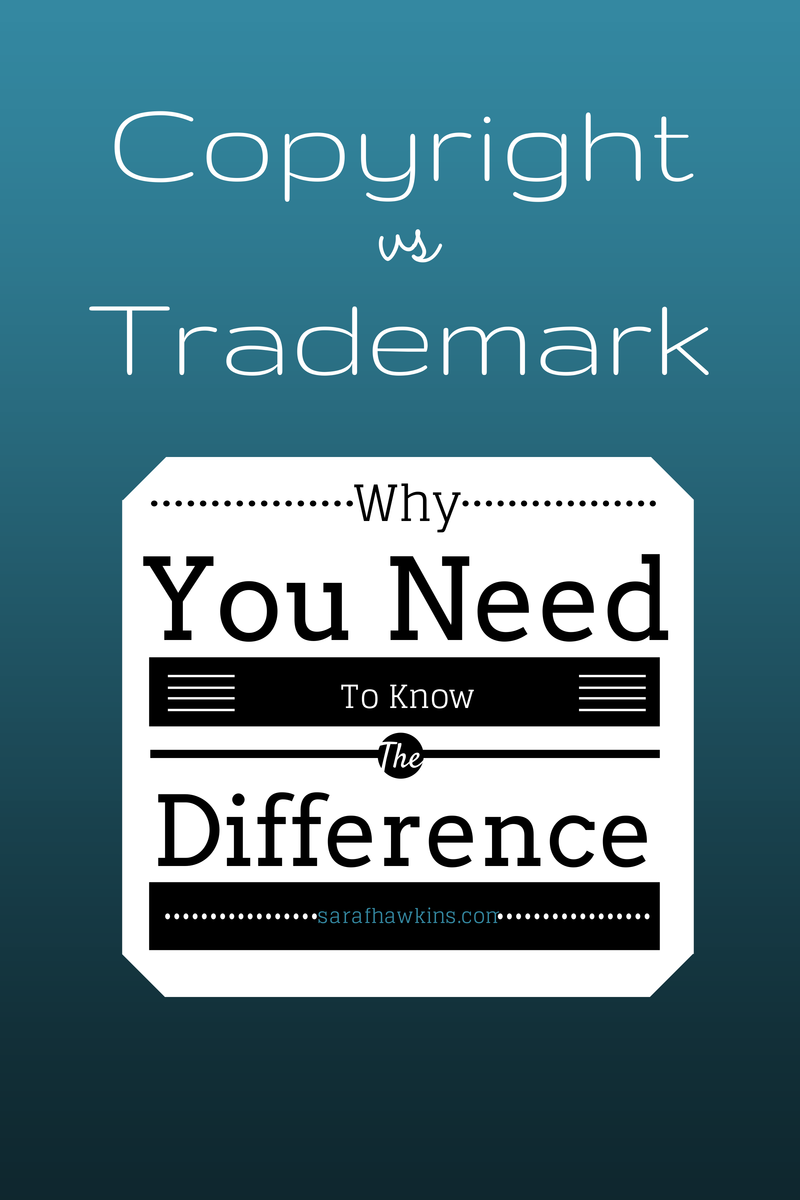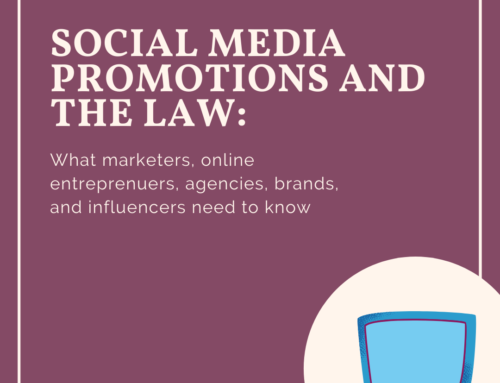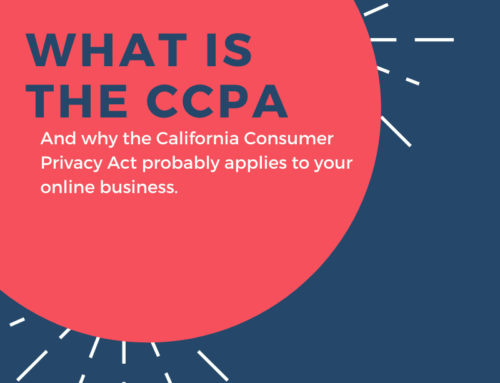It’s not uncommon to find a news article that misuses copyright and trademark, as if they are interchangeable. Sometimes, even lawyers misunderstand their differences. But you don’t have to make their same mistakes. I’m here to help explain the difference between copyright and trademark and why knowing the differences is important for you as a business professional.
Copyright copyright vs trademark
I’ve written quite a bit about copyright and what is protected with copyright. In general, US Copyright applies to original works of authorship fixed in a tangible medium. “Original” means that an author produced a work by his or her own intellectual effort instead of copying or modifying it from an existing work. “Fixed in a tangible medium” means that the work is able to be perceived, reproduced, or otherwise communicated. A “tangible medium” can be any of a host of things – a blog, a book (digital or paper), an infographic, a digital photo, a printed image, and so many other things. The 1976 United States Copyright Act generally gives the copyright holder the exclusive right to reproduce the copyrighted work, to prepare derivative works, to distribute copies or phonorecords (lawyer speak for how music was distributed back in the day) of the copyrighted work, to perform the copyrighted work publicly, or to publicly display the copyrighted work.
The concept of a “work of authorship” becomes more vague as new technology arrives. While it is unclear if a tweet is copyrightable, it’s often much more clear whether a blog post, a photo or video, an original blog graphic, or an infographic is sufficiently original as to be copyrightable. And while something as short as a haiku can be copyrighted, a basic list of 20 websites or people would not be copyrightable without more than just a numbered list.
A copyright is automatic, but registration with the US Copyright Office will give you more rights if someone were to infringe your copyright. You are not required to put the “circle c” on your work to designate you are staking claim to the copyright. It helps if you put some identifying information on your work, especially if it is shared online and could easily be appropriated.
Trademark
A trademark is a single word, a short phrase, a design, or a symbol or a combination of these which identifies or distinguishes the source of the goods or services of one person/company from those belonging to another. While those are the general categories, there are registered trademarks for shapes, sounds, fragrances, and colors.
Like copyright, you can obtain legal rights in a trademark without registration. Unlike copyright, trademark rights are not automatic but, instead, come about from use. Trademark law is handled by both federal and state laws. Registering a trademark with the US Patent and Trademark Office will give the owner significant rights to prevent others from using the mark if it confuses or is likely to confuse the buying public about who the goods or services come from.
For example, even if your last name is Lowe you can’t open up a home improvement store and call it Lowe’s. Sure, it’s your name and your life-long dream. But there is another home improvement store with the same name and consumers would likely be confused as to who the store belongs to. But, you could open up a cupcake shop called Lowe’s because the likelihood that anyone would think that all of a sudden this home improvement store branched out to cupcake shops is very low and the likelihood of confusion may be non-existent. Of course, there may be other legal hurdles to using the name Lowe’s for a cupcake shop but it won’t come from the home improvement store.
Trademarks are an important business asset. Control of a mark is needed to maintain a brand image, establish the origin of particular goods or services, and create a psychological response in consumers when they see the mark. Companies spend considerable amounts of money to own marks, often long before a product or service is created.
With that example, you can begin to understand that trademark law is very complex. It’s so complex that many lawyers are confused about it and leave trademark matters to lawyers who specialize in that area. And, sadly, there are lawyers who confuse trademark with copyright and make complete fools of themselves and embarrass the profession.
Copyright vs Trademark
The few similarities
1. Both provide the owner with the right to exclude others from using their work without permission.
2. Copyright and Trademark can exist simultaneously in some designs, symbols, shapes, sounds, or colors.
3. Both are protected by complex laws that don’t always easily apply to how the digital world works.
4. The owner does not need to put any special symbol or notice on the mark or work to obtain or maintain their rights.
The many differences
1. Copyright is automatic but trademark requires use and distinctiveness (and likely registration if you want any real protections).
2. A copyright holder can prevent others from using their work publicly under very broad rights while a trademark holder may not be able to prevent others from publicly using their mark.
3. The tests for infringement are vastly different, with trademark infringement being much more complex.
4. Copyright law requires compulsory license and royalty payments whereas there is no similar system for trademark law.
5. The length of time a work is protected by copyright (for a work created after 2002) is generally the life of the author plus 70 years. For a trademark, so long as the mark remains distinctive, and if it is a federally registered mark and the required periodical filings are done, the duration could potentially be endless. Trademarks don’t fall into the Public Domain after a certain time while copyright will.
6. Online infringement of a copyright often can be quickly handled under the Digital Millennium Copyright Act (DMCA), while trademark infringement has no equivalent non-judicial process. Sending a DMCA takedown is often a first step with online copyright infringement whereas online trademark infringement must follow the seemingly archaic steps of either the state or federal trademark statutes.
7. Trademark is protected by both state and federal laws. Copyright laws are federal.
8. While both trademark and copyright law include a fair use doctrine, they are not the same and are often create a great deal of confusion.
Why You Need To Know
When it comes to the online world, it’s especially important to understand the difference between copyright and trademark so you know what methods exist for protection. All too often, there are situations where a person or company tries to enforce their trademark using the DMCA copyright laws. Not only does this not work, but you come off looking foolish and may make the situation worse.
You also need to know the difference so you know how to appropriately use your intellectual property. Improper use of a trademark may dilute your rights or create confusion. Inconsistent enforcement of your trademark rights can cause you to lose protections afforded under state or federal law. With copyright, that isn’t the case. As a copyrightholder, you can pick and choose which cases of infringement you pursue without diminishing the host of exclusive rights under copyright law.
Trademark is especially important for new companies or new products. Companies and entrepreneurs often invest a great deal of time and money before launching a new product or company. One of the worst things is to come out with your new product or launch your new company and realize another company owns the trademark or yours is too similar to another and causes confusion among consumers.
Finally, the basic distinctions between trademark and copyright are important for every business person and entrepreneur to know so you are able to best protect your assets, respond to someone claiming infringement, or pursue action for infringement. Understanding the difference between the two may help in making business decisions regarding product launch timelines or social media strategies. Most importantly, when business people know the difference between copyright and trademark they have an advantage over those who don’t and can protect their valuable property appropriately.
Have additional questions? Please leave a comment and I’ll do my best to answer. Looking to hire an attorney to help you with your business, contact my office directly to determine if I can help.






Great info Sara! Thank You!
Excellent information Sara. Always useful for those of us working in the digital space.
Very important matter thanks
[…] you know the difference between Copyright and Trademark? Sara F. Hawkins, Attorney at Law, tells us the […]
[…] The Difference Between Copyright and Trademark And Why You Need to Know is a blog post by an attorney who specializes in intellectual property. […]
[…] reading into the rules behind this, as I had to do. And likewise, you can dive deeper into the difference between a copyrighted phrase and a trademark phrase […]
[…] Interestingly, there’s an article over on Sir TapTap that explains that Nintendo isn’t really in the right here with shutting down so many fan-made projects on the grounds of them having to protect their copyrights lest they lose them forever. In fact, they quote lawyer Sara F. Hawkins, who explains on her website… […]
[…] interested in the differences, this government overview defines the main differences and this article explains the legal concepts very […]
[…] “But TapTap,” you bellow, outraged, “You’re not a lawyer!” I’m not! I’m a spikeball. But Sara F Hawkins is a lawyer, and she has a nice little article explaining the difference between copyright and trademark. […]
[…] “But TapTap,” you bellow, outraged, “You’re not a lawyer!” I’m not! I’m a spikeball. But Sara F Hawkins is a lawyer, and she has a nice little article explaining the difference between copyright and trademark. […]
I’m starting a new business very soon. I have ““created“ a new word has the name of the company by combining two words. It is also a business that will be art related. I will be selling my designs on merchandise. I want to make sure both my company name andArtwork would be covered. What would you suggest either or both?
With regard to the name of the company, it’s always advisable to obtain a trademark clearance to ensure your use is not infringing another’s mark. For the designs on your merchandise, that’s a copyright matter and if you are not wholly designing the work but are relying on other works for inspiration or incorporating other works there could be liability concerns depending on the specifications around each design or license used if you’ve obtained the work under a license.
Super information Sara. Many business owners are still not aware of the difference between trademark and copyright but you have delivered awesome information. Keep it up.